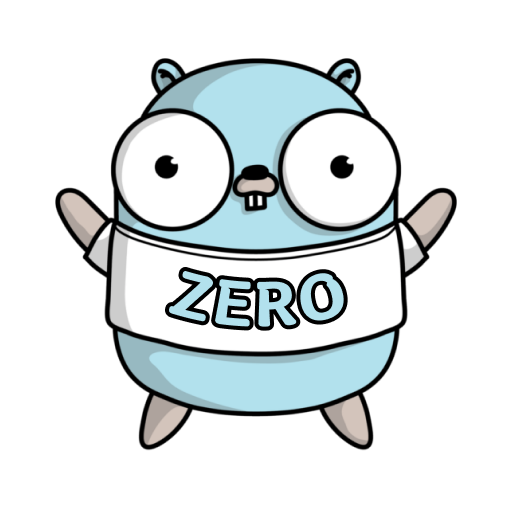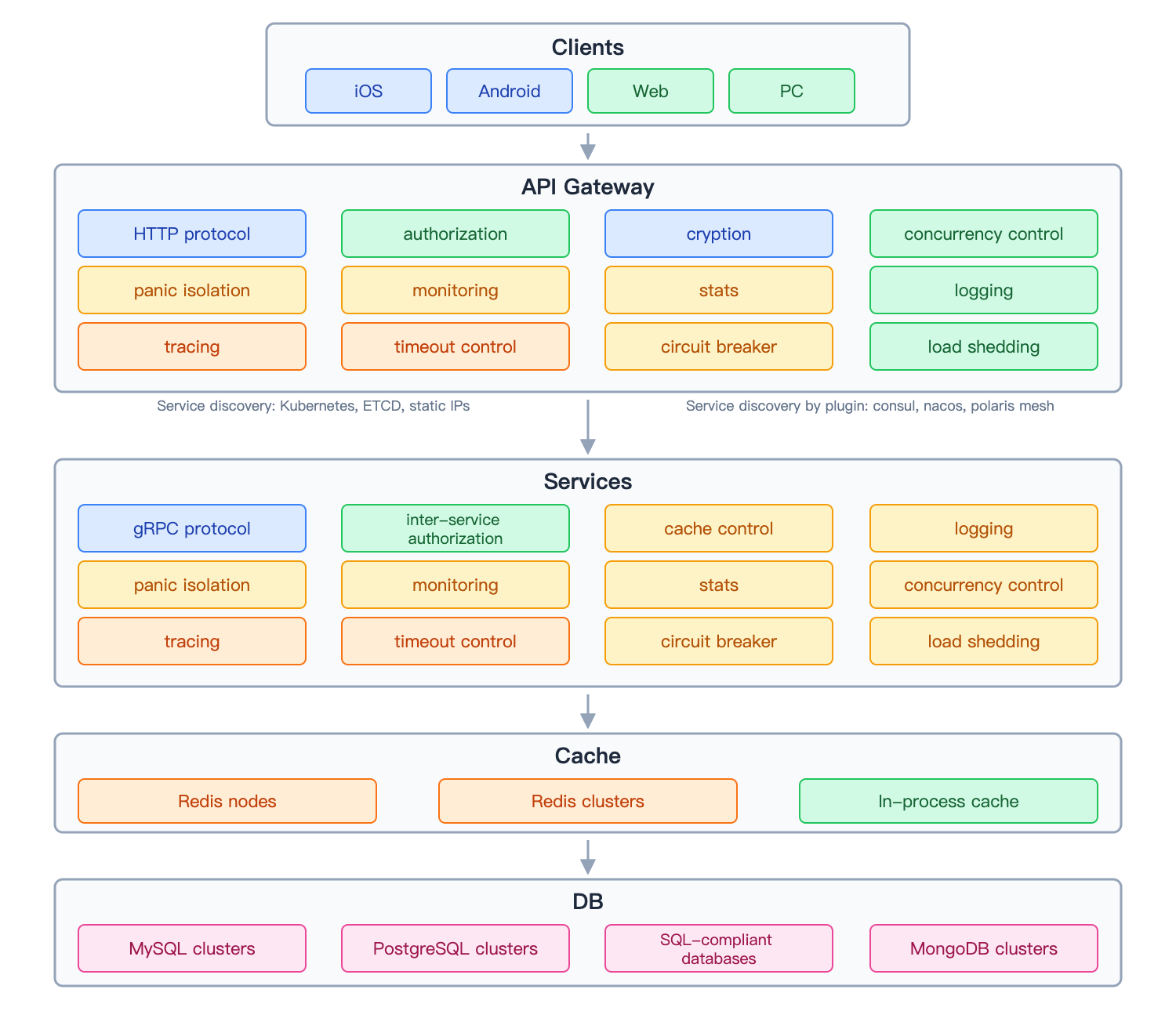

 ## Backgrounds of go-zero
At the beginning of 2018, we decided to re-design our system, from monolithic architecture with Java+MongoDB to microservice architecture. After research and comparison, we chose to:
In early 2018, we embarked on a transformative journey to redesign our system, transitioning from a monolithic architecture built with Java and MongoDB to a microservices architecture. After careful research and comparison, we made a deliberate choice to:
* Go Beyond with Golang
* Great performance
* Simple syntax
* Proven engineering efficiency
* Extreme deployment experience
* Less server resource consumption
* Self-Design Our Microservice Architecture
* Microservice architecture facilitates the creation of scalable, flexible, and maintainable software systems with independent, reusable components.
* Easy to locate the problems within microservices.
* Easy to extend the features by adding or modifying specific microservices without impacting the entire system.
## Design considerations on go-zero
By designing the microservice architecture, we expected to ensure stability, as well as productivity. And from just the beginning, we have the following design principles:
* Keep it simple
* High availability
* Stable on high concurrency
* Easy to extend
* Resilience design, failure-oriented programming
* Try best to be friendly to the business logic development, encapsulate the complexity
* One thing, one way
After almost half a year, we finished the transfer from a monolithic system to microservice system and deployed on August 2018. The new system guaranteed business growth and system stability.
## The implementation and features of go-zero
go-zero is a web and rpc framework that integrates lots of engineering practices. The features are mainly listed below:
* Powerful tool included, less code to write
* Simple interfaces
* Fully compatible with net/http
* Middlewares are supported, easy to extend
* High performance
* Failure-oriented programming, resilience design
* Builtin service discovery, load balancing
* Builtin concurrency control, adaptive circuit breaker, adaptive load shedding, auto-trigger, auto recover
* Auto validation of API request parameters
* Chained timeout control
* Auto management of data caching
* Call tracing, metrics, and monitoring
* High concurrency protected
As below, go-zero protects the system with a couple of layers and mechanisms:

## The simplified architecture that we use with go-zero
## Backgrounds of go-zero
At the beginning of 2018, we decided to re-design our system, from monolithic architecture with Java+MongoDB to microservice architecture. After research and comparison, we chose to:
In early 2018, we embarked on a transformative journey to redesign our system, transitioning from a monolithic architecture built with Java and MongoDB to a microservices architecture. After careful research and comparison, we made a deliberate choice to:
* Go Beyond with Golang
* Great performance
* Simple syntax
* Proven engineering efficiency
* Extreme deployment experience
* Less server resource consumption
* Self-Design Our Microservice Architecture
* Microservice architecture facilitates the creation of scalable, flexible, and maintainable software systems with independent, reusable components.
* Easy to locate the problems within microservices.
* Easy to extend the features by adding or modifying specific microservices without impacting the entire system.
## Design considerations on go-zero
By designing the microservice architecture, we expected to ensure stability, as well as productivity. And from just the beginning, we have the following design principles:
* Keep it simple
* High availability
* Stable on high concurrency
* Easy to extend
* Resilience design, failure-oriented programming
* Try best to be friendly to the business logic development, encapsulate the complexity
* One thing, one way
After almost half a year, we finished the transfer from a monolithic system to microservice system and deployed on August 2018. The new system guaranteed business growth and system stability.
## The implementation and features of go-zero
go-zero is a web and rpc framework that integrates lots of engineering practices. The features are mainly listed below:
* Powerful tool included, less code to write
* Simple interfaces
* Fully compatible with net/http
* Middlewares are supported, easy to extend
* High performance
* Failure-oriented programming, resilience design
* Builtin service discovery, load balancing
* Builtin concurrency control, adaptive circuit breaker, adaptive load shedding, auto-trigger, auto recover
* Auto validation of API request parameters
* Chained timeout control
* Auto management of data caching
* Call tracing, metrics, and monitoring
* High concurrency protected
As below, go-zero protects the system with a couple of layers and mechanisms:

## The simplified architecture that we use with go-zero
 ## Installation
Run the following command under your project:
```shell
go get -u github.com/zeromicro/go-zero
```
## Quick Start
1. Full examples can be checked out from below:
[Rapid development of microservice systems](https://github.com/zeromicro/zero-doc/blob/main/doc/shorturl-en.md)
[Rapid development of microservice systems - multiple RPCs](https://github.com/zeromicro/zero-doc/blob/main/docs/zero/bookstore-en.md)
2. Install goctl
`goctl`can be read as `go control`. `goctl` means not to be controlled by code, instead, we control it. The inside `go` is not `golang`. At the very beginning, I was expecting it to help us improve productivity, and make our lives easier.
```shell
# for Go
go install github.com/zeromicro/go-zero/tools/goctl@latest
# For Mac
brew install goctl
# docker for amd64 architecture
docker pull kevinwan/goctl
# run goctl like
docker run --rm -it -v `pwd`:/app kevinwan/goctl --help
# docker for arm64(Mac) architecture
docker pull kevinwan/goctl:latest-arm64
# run goctl like
docker run --rm -it -v `pwd`:/app kevinwan/goctl:latest-arm64 --help
```
make sure goctl is executable.
3. Create the API file, like greet.api, you can install the plugin of goctl in vs code, api syntax is supported.
```go
type (
Request {
Name string `path:"name,options=[you,me]"` // parameters are auto validated
}
Response {
Message string `json:"message"`
}
)
service greet-api {
@handler GreetHandler
get /greet/from/:name(Request) returns (Response)
}
```
the .api files also can be generated by goctl, like below:
```shell
goctl api -o greet.api
```
4. Generate the go server-side code
```shell
goctl api go -api greet.api -dir greet
```
the generated files look like:
```Plain Text
├── greet
│ ├── etc
│ │ └── greet-api.yaml // configuration file
│ ├── greet.go // main file
│ └── internal
│ ├── config
│ │ └── config.go // configuration definition
│ ├── handler
│ │ ├── greethandler.go // get/put/post/delete routes are defined here
│ │ └── routes.go // routes list
│ ├── logic
│ │ └── greetlogic.go // request logic can be written here
│ ├── svc
│ │ └── servicecontext.go // service context, mysql/redis can be passed in here
│ └── types
│ └── types.go // request/response defined here
└── greet.api // api description file
```
the generated code can be run directly:
```shell
cd greet
go mod init
go mod tidy
go run greet.go -f etc/greet-api.yaml
```
by default, it’s listening on port 8888, while it can be changed in the configuration file.
you can check it by curl:
```shell
curl -i http://localhost:8888/greet/from/you
```
the response looks like below:
```http
HTTP/1.1 200 OK
Date: Sun, 30 Aug 2020 15:32:35 GMT
Content-Length: 0
```
5. Write the business logic code
* the dependencies can be passed into the logic within servicecontext.go, like mysql, redis, etc.
* add the logic code in a logic package according to .api file
6. Generate code like Java, TypeScript, Dart, JavaScript, etc. just from the api file
```shell
goctl api java -api greet.api -dir greet
goctl api dart -api greet.api -dir greet
...
```
## Benchmark

[Checkout the test code](https://github.com/smallnest/go-web-framework-benchmark)
## Documents
* [Documents](https://go-zero.dev/)
* [Rapid development of microservice systems](https://github.com/zeromicro/zero-doc/blob/main/doc/shorturl-en.md)
* [Rapid development of microservice systems - multiple RPCs](https://github.com/zeromicro/zero-doc/blob/main/docs/zero/bookstore-en.md)
* [Examples](https://github.com/zeromicro/zero-examples)
## Chat group
Join the chat via https://discord.gg/4JQvC5A4Fe
## Cloud Native Landscape
## Installation
Run the following command under your project:
```shell
go get -u github.com/zeromicro/go-zero
```
## Quick Start
1. Full examples can be checked out from below:
[Rapid development of microservice systems](https://github.com/zeromicro/zero-doc/blob/main/doc/shorturl-en.md)
[Rapid development of microservice systems - multiple RPCs](https://github.com/zeromicro/zero-doc/blob/main/docs/zero/bookstore-en.md)
2. Install goctl
`goctl`can be read as `go control`. `goctl` means not to be controlled by code, instead, we control it. The inside `go` is not `golang`. At the very beginning, I was expecting it to help us improve productivity, and make our lives easier.
```shell
# for Go
go install github.com/zeromicro/go-zero/tools/goctl@latest
# For Mac
brew install goctl
# docker for amd64 architecture
docker pull kevinwan/goctl
# run goctl like
docker run --rm -it -v `pwd`:/app kevinwan/goctl --help
# docker for arm64(Mac) architecture
docker pull kevinwan/goctl:latest-arm64
# run goctl like
docker run --rm -it -v `pwd`:/app kevinwan/goctl:latest-arm64 --help
```
make sure goctl is executable.
3. Create the API file, like greet.api, you can install the plugin of goctl in vs code, api syntax is supported.
```go
type (
Request {
Name string `path:"name,options=[you,me]"` // parameters are auto validated
}
Response {
Message string `json:"message"`
}
)
service greet-api {
@handler GreetHandler
get /greet/from/:name(Request) returns (Response)
}
```
the .api files also can be generated by goctl, like below:
```shell
goctl api -o greet.api
```
4. Generate the go server-side code
```shell
goctl api go -api greet.api -dir greet
```
the generated files look like:
```Plain Text
├── greet
│ ├── etc
│ │ └── greet-api.yaml // configuration file
│ ├── greet.go // main file
│ └── internal
│ ├── config
│ │ └── config.go // configuration definition
│ ├── handler
│ │ ├── greethandler.go // get/put/post/delete routes are defined here
│ │ └── routes.go // routes list
│ ├── logic
│ │ └── greetlogic.go // request logic can be written here
│ ├── svc
│ │ └── servicecontext.go // service context, mysql/redis can be passed in here
│ └── types
│ └── types.go // request/response defined here
└── greet.api // api description file
```
the generated code can be run directly:
```shell
cd greet
go mod init
go mod tidy
go run greet.go -f etc/greet-api.yaml
```
by default, it’s listening on port 8888, while it can be changed in the configuration file.
you can check it by curl:
```shell
curl -i http://localhost:8888/greet/from/you
```
the response looks like below:
```http
HTTP/1.1 200 OK
Date: Sun, 30 Aug 2020 15:32:35 GMT
Content-Length: 0
```
5. Write the business logic code
* the dependencies can be passed into the logic within servicecontext.go, like mysql, redis, etc.
* add the logic code in a logic package according to .api file
6. Generate code like Java, TypeScript, Dart, JavaScript, etc. just from the api file
```shell
goctl api java -api greet.api -dir greet
goctl api dart -api greet.api -dir greet
...
```
## Benchmark

[Checkout the test code](https://github.com/smallnest/go-web-framework-benchmark)
## Documents
* [Documents](https://go-zero.dev/)
* [Rapid development of microservice systems](https://github.com/zeromicro/zero-doc/blob/main/doc/shorturl-en.md)
* [Rapid development of microservice systems - multiple RPCs](https://github.com/zeromicro/zero-doc/blob/main/docs/zero/bookstore-en.md)
* [Examples](https://github.com/zeromicro/zero-examples)
## Chat group
Join the chat via https://discord.gg/4JQvC5A4Fe
## Cloud Native Landscape


